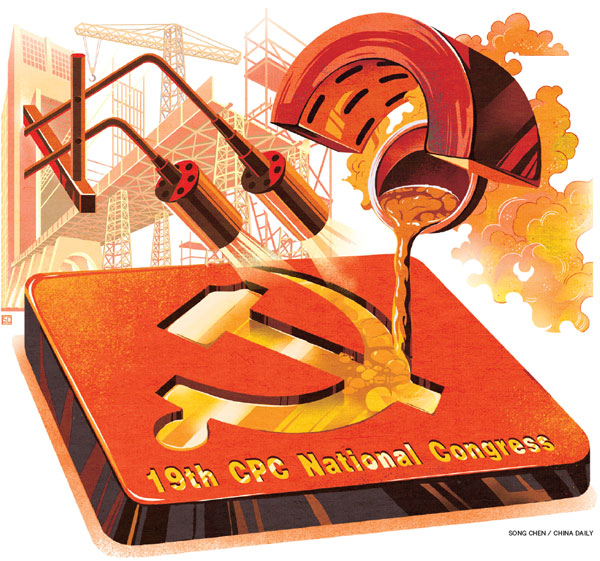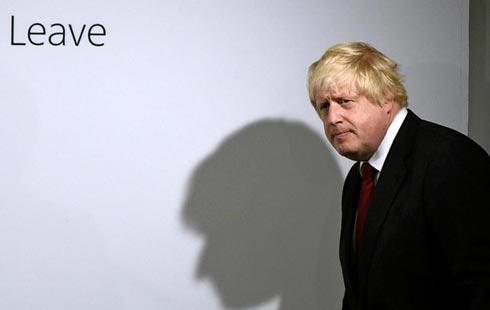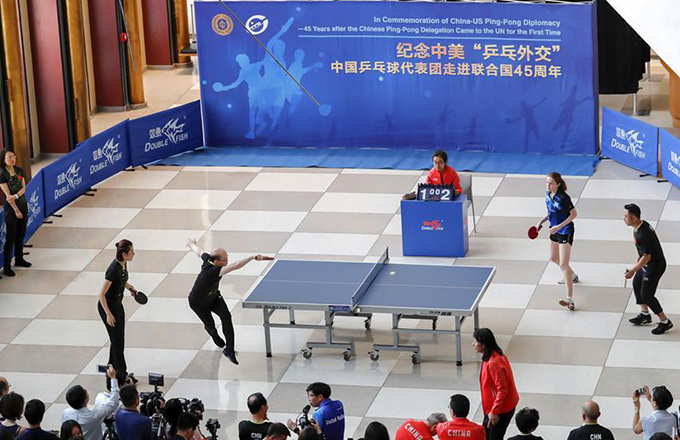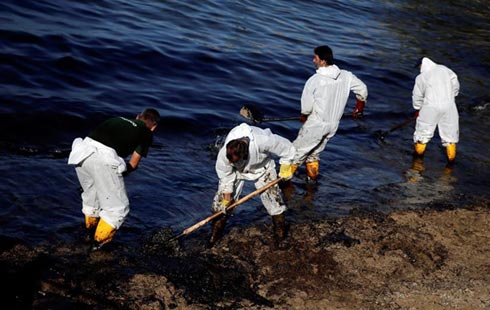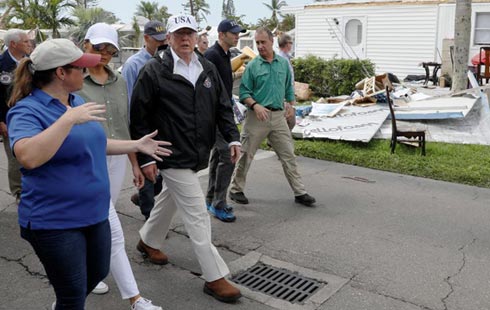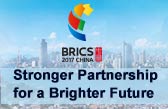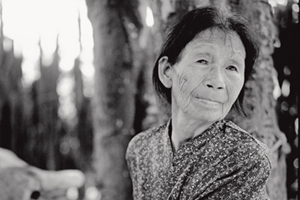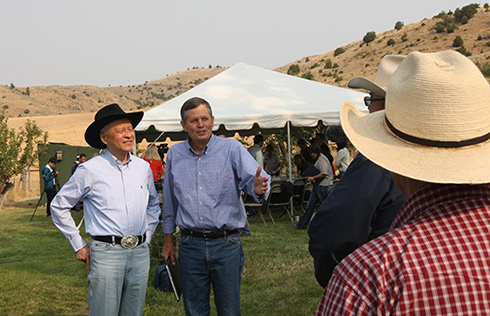British MP sees world changing through China's leadership
Editor's note: The Communist Party of China will hold its 19th National Congress on Oct 18. In the runup to the meeting, China Daily asked three prominent experts to provide their views on developments in China and the country's global leadership.
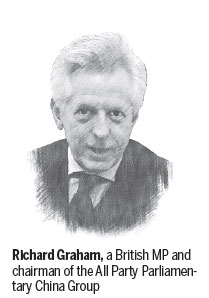
China's ability to balance its international responsibilities while overcoming domestic challenges will be a key issue for the 19th Party Congress this year, according to Richard Graham, a British member of Parliament and chairman of the All Party Parliamentary China Group.
Graham said he is keen to learn how the congress will address such issues as China's reform of State-owned enterprises, the transformation of its banking system and the country's engagement with foreign businesses.
He said it is encouraging to see China taking on a greater leadership role internationally - such as starting the Asian Infrastructure Investment Bank - and increasing its contribution to United Nations-led issues. He was also impressed by President Xi Jinping's advocacy of globalization at the World Economic Forum in Davos this year.
"China is important not just because of the size of its economy and the huge purchasing power and investments overseas, but also because it is a role model and can give encouragement to neighboring countries, particularly in Central Asia, through a variety of opportunities," Graham said. "Because of this leadership role and responsibility, China's words and actions will be listened to more carefully and scrutinized more carefully."
Graham, who first visited the Chinese mainland in 1980, has developed extensive relationships with the country over the decades. He has personally contributed to the UK-China relationship in significant ways.
For example, he helped with the first listing of a Chinese company on the London Stock Exchange, created a new Shanghai Cricket Club and launched the British Chamber of Commerce in Shanghai.
He was also one of the first people to cross the Taklimakan Desert in the Xinjiang Uygur autonomous region in 1993.
Having observed China's rapid growth, Graham said he is impressed by how its international engagement grew, not just in the business and political fields but on a cultural and people-to-people exchange level.
"China has been continuing to open up and internationalize. Chinese people now speak better English and have a better understanding of international systems and structures. That's a positive change because it's all about China's engagement with the world," Graham said.
"China is the world's second-largest economy, and the way it adjusts and adapts to a world where it will have more engagement with different countries is incredibly important."
In 2015, Graham, in his capacity as chairman of the All Party Parliamentary China Group, welcomed Xi to the British Parliament during the president's state visit to the UK.
Graham said the experience was a "great honor" and that it was a good opportunity for British politicians to "get some feel for what the president of such a great country is like".
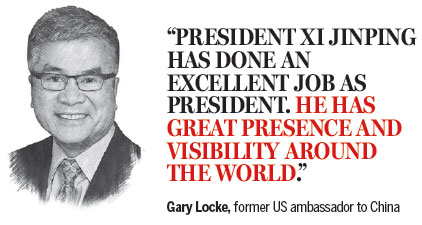
As a two-term governor of the US state of Washington from 1997 to 2005 and United States secretary of commerce from 2009 to 2011, Gary Locke fostered economic relations between his state and China. Then, as US ambassador to China from 2011 to 2014, Locke worked to open markets for US-made goods and services.
Since leaving public office, Locke has remained steadfastly committed to facilitating cross-Pacific business and trade. As legal counsel for the Seattle-based international law firm Davis Wright Tremaine, Locke currently consults with clients on issues regarding international trade, regulatory issues and investment policies.
The Q&A below reflects some of Locke's thoughts on China's recent development, and on the coming leadership meeting that will steer the country into the future.
What do you feel has been China's biggest achievement over the past five years? What's the most notable change you've observed?
The growing prosperity of the Chinese people and the growing number of Chinese who are middle class. China now perhaps is the world's most modern civilization and yet the oldest, the transformation of China has just been unbelievable.
What three words would you use to describe China today?
I would say modern, ancient and energetic. China is on the move.
What's the biggest challenge China faces, and how do you feel the country can go about overcoming it?
The biggest challenge is still closing the gap between the poor who live in the countryside and the growing middle class of the cities, ensuring that there is economic prosperity for its entire people. Another big challenge is providing care for the growing number of elderly in China. China is already working on moving more people from the countryside to urban areas. It has been done very carefully. I think it is important for China to open its markets, allowing foreign companies to invest in the country and to create jobs for the Chinese people. There are many companies in the West and the United States who have great experience and expertise in providing medical care and physical care for the elderly, from nursing homes to assisted living to retirement homes.
What are your expectations for the upcoming 19th National Congress of the Communist Party of China? What are the key issues you care about most?
A lot of people are wondering what will happen in terms of who will be on the Standing Committee and what economic policies the congress will establish - whether the reform effort will continue and what will be the areas of emphasis, as well as the pace or speed of reform.
What is your impression of President Xi Jinping?
President Xi Jinping has done an excellent job as president. He has great presence and visibility around the world. The Belt and Road Initiative is receiving positive reviews around the world, especially in those undeveloped countries that will benefit. He is doing very well in talking about the needs of global cooperation and avoiding protectionism. He has done much to help bring stability and prosperity to the people of China.
How do you view China's role in today's world? Do you believe that some of China's experiences or practices could be used to solve pressing global problems? If so, what are they?
China is a very important country. All the different issues confronting the world - from climate change to fighting diseases, fighting terrorism, to ensuring peace and stability - require the active role of China.
What do you think China will be like in five years' time? How do you view China's longer-term future?
China will continue to grow economically and prosper and it will continue to modernize. It is moving away from low-cost, low-wage manufacturing of goods to be exported around the world, to an economy that is more innovation and technology based.
What's the most memorable experience or moment you've had in China, or related to China?
Two moments: The first is taking our children and family to travel throughout China, to discover the China of their ancestors by visiting places outside the cities of Beijing and Shanghai. That was a great experience for the children and family that we will never forget. The second one was actually visiting the family village to see where my father, my grandfather and ancestors were born.
What's your expectation for the US-China relationship in the next five years?
This is a very delicate and sensitive time for the US-China relationship. Hopefully president Trump will follow the policies of past presidents, Democrats and Republicans, since Nixon breathed life into the US-China relationship. There are issues. There are areas of differences. But common interests outweigh the areas of disagreement. The American people and Chinese people have benefited from the growing economic, political and cultural ties between our two countries. The world will benefit from a strong US-China relationship.
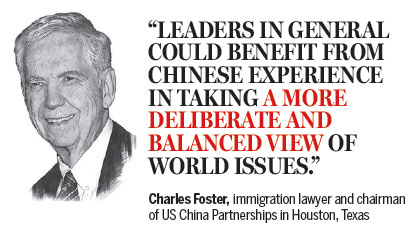
What do you think about the current influence of China in the world?
China's influence in the world today is greater than it has been in modern history. Clearly the two most powerful countries, economically and politically, in the world are the United States and the People's Republic of China.
How do you evaluate President Xi Jinping's performance as the leader of a great power?
President Xi Jinping is an intelligent, adept and patient leader and is leading China into becoming an even greater, larger and more responsible global power.
What do you think about the future of China?
I think the future of China, on balance, is positive.
Its leadership is capable and responsible, and wisely focuses on the long-term needs and prosperity of the Chinese people. The leadership takes a long view of what is necessary for the continued growth and prosperity.
What Chinese wisdom and Chinese experience do you think could be used to solve the urgent problems facing the world?
Leaders in general could benefit from Chinese experience in taking a more deliberate and balanced view of world issues, putting things into perspective, rather than often reacting and taking very short-term positions for the next news cycle.
What do you think are the biggest changes in China in the past five years? What is its biggest achievement?
The biggest changes that have taken place in the last five years continue to be the ability of China, often despite dire predictions, to continue to grow its economy in a balanced way.
Also under the leadership of President Xi Jinping in dealing with corruption that often not only impedes wise economic growth, but also is an issue that if not dealt with properly could undermine support for the government.
What three words would you use to describe China today?
Big, successful and necessary.
What do you think is the biggest challenge China is facing now? Can you give some advice on how to deal with this challenge?
I think the biggest challenge that China now faces is how to continue to grow the economy and provide prosperity to the Chinese people while at the same time dealing with important social issues, which in the long run may be just as important to the people as their material well-being.
China has been extremely successful in bringing prosperity and order, particularly after some earlier disastrous economic policies, and the "cultural revolution" (1966-76). I think it is even more important for China to deal with other issues that - once material needs have been met - are critical, starting with environmental issues, some real and perceived concerns about food security and the important need to provide national peace and stability with individual rights.
I think China can learn from the United States in terms of our successes and sometimes our failures. The US has shown that one of the strengths of a great power is that it can tolerate a certain level of dissent without undermining the government in any way.
On the other hand, China can learn negative lessons from the United States in the sense that often our fractured government leads to an inability to develop coherent and rational policies based upon what is in the real long-term interest of the country economically, politically and socially.
What's the most memorable experience or moment you've had in China, or related to China?
There are so many memorable experiences I have had since I first visited China in 1979, but the biggest is how China has so quickly developed economically.
It has often been said, China has literally raised more people out of poverty faster than any country in the history of the world.
I particularly remember going with my wife in the mid-1990s to Pudong (in Shanghai) and being told by a Chinese planner how they were going to build a new Manhattan and thinking how preposterous that was - and then being able to return periodically to Shanghai to literally see a new Manhattan rapidly developing in Pudong.
Finally, having greeted Deng Xiaoping at the Houston area Simonton Rodeo in 1979, where he was being presented with a 10-gallon Stetson cowboy hat.
Years later, returning to the new, beautifully, remodeled Chinese National Museum in Tian'anmen Square, I saw that the hat was encased as part of a large Deng Xiaoping exhibit, and I was able to point out that someone had pushed the crown of the hat down and flattened it, and it needed to be puffed out. And it was. My small contribution to US-Chinese relations.
cecily.liu@mail.chinadailyuk.com
